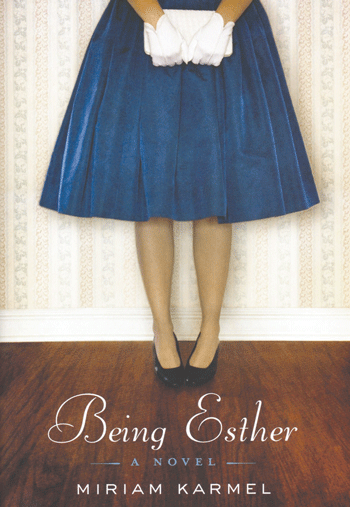Being Esther: A Novel, by Miriam Karmel, Milkweed Editions, 187 pages, $22
Reviewed by NEAL GENDLER
A bittersweet joy, the first novel by Miriam Karmel is a perfect-pitch account of living on after a very full life — youth, marriage, child-rearing and social activities — has become the past.
Esther Lustig is 85, widowed, with adult children who became less than she’d hoped. She has downsized from Chicago’s northern suburbs to a city apartment, her world shrinking similarly. She’s healthy enough to live on her own — with some adjustments, of course, such as Velcro-closing shoes because her bent, stiff fingers can no longer tie laces.
Esther isn’t filled with self-pity, just awareness of her limitations and of how others see her. She appreciates that her medical-researcher son-in-law doesn’t talk down to her, “though lately, more and more people do just that, as if age has shrouded her in stupidity,” Karmel writes.
As daily events remind her of them, we learn of Esther’s previous decades, which illustrate a familiar generational progression: Yiddish-speaking immigrant parents whose children go into business and raise families in suburbia, and that generation’s children becoming professionals who drift from religion and tradition.
That Karmel, who is younger than 85, could capture so well the inner life of the old is a tribute to her powers of observation and empathy. That she could express this life with such clarity and wit is a tribute to her writing skill, for Being Esther is anything but a dirge. It is a delight.

Esther’s married name means “funny” in German, and Karmel has a way of turning phrases that bring smiles even from Esther’s frustrations and confrontations with changes that illuminate her loss of vigor and involvement in the world. Determined to reestablish contact with friends with whom she’s lost touch, she works her way through her address book only to find many no longer alive to answer. She and friend Lorraine take turns phoning each other every morning — just to check.
At dinner, she catches her beautiful granddaughter and loopy-looking boyfriend exchanging a glance as if to say Esther no longer can track a conversation.
“Esther has the urge to tell them that growing old is one of the most surprising things that has happened to her,” Karmel writes. “She hadn’t given it any thought. Then one day, she was 85. She is old. Not just old, but an object of derision, pity. Is there any use explaining that she is still herself — albeit a slower, achier, creakier version of the original?”
Karmel, who lives in Minneapolis and Sandisfield, Mass., needs only those six sentences to speak volumes about aging.
True, some people, blessed with good health, continue vigorous social involvement well into years now called “old old,” in contrast with the retiring boomer generation that’s called “young old.” But both groups may recognize a good deal of themselves in Esther. Younger readers can gain an insider’s view into their aging parents and grandparents.
On its surface, Being Esther is a hoot, albeit one tinged with sadness. For example, she resists her daughter’s efforts to move her to an assisted-living residence, dismissing it with contempt as “Bingoland.” Esther goes there to visit Helen, a friend from childhood, and sees that Cedar Shores is not the carefree senior vacation its brochures appear to advertise. The place is dowdier, and so is the formerly fashionable, lively Helen, now wearing a faded muumuu that keeps falling off a shoulder as her mind slips in and out of the present.
Both funny and melancholy, Being Esther is a charming and amusing peek beneath aging’s surface of sags and wrinkles, and it’s so good that it’s hard to put down. Older readers can laugh at Esther’s recognition of “the infinite frustrations of living in an aging body.” Younger old people can see what lies ahead if they’re lucky to live so long. Young readers may find it all quite hilarious. The message to them? “Just wait.”
***
Neal Gendler is a Minneapolis writer and editor.
(American Jewish World, 5.10.13)



















